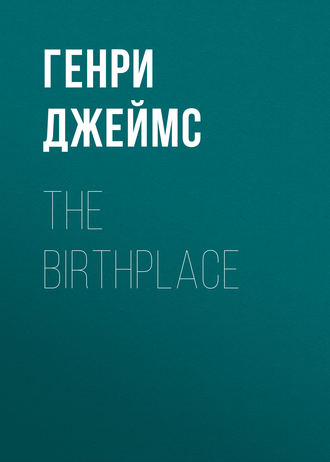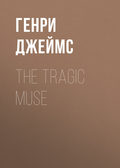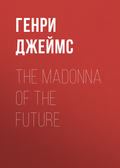
Генри Джеймс
The Birthplace
VI
It had made for him, all the same, an immense difference; it had given him an extraordinary lift, so that a certain sweet aftertaste of his freedom might a couple of months later have been suspected of aiding to produce for him another and really a more considerable adventure. It was an absurd way to reason, but he had been, to his imagination, for twenty minutes in good society—that being the term that best described for him the company of people to whom he hadn't to talk, as he phrased it, rot. It was his title to good society that he had, in his doubtless awkward way, affirmed; and the difficulty was just that, having affirmed it, he couldn't take back the affirmation. Few things had happened to him in life, that is few that were agreeable, but at least this had, and he wasn't so constructed that he could go on as if it hadn't. It was going on as if it had, however, that landed him, alas! in the situation unmistakably marked by a visit from Grant-Jackson late one afternoon toward the end of October. This had been the hour of the call of the young Americans. Every day that hour had come round something of the deep throb of it, the successful secret, woke up; but the two occasions were, of a truth, related only by being so intensely opposed. The secret had been successful in that he had said nothing of it to Isabel, who, occupied in their own quarter while the incident lasted, had neither heard the visitors arrive nor seen them depart. It was on the other hand scarcely successful in guarding itself from indirect betrayals. There were two persons in the world at least who felt as he did; they were persons also who had treated him, benignly, as feeling after their style; who had been ready in fact to overflow in gifts as a sign of it, and though they were now off in space they were still with him sufficiently in spirit to make him play, as it were, with the sense of their sympathy. This in turn made him, as he was perfectly aware, more than a shade or two reckless, so that, in his reaction from that gluttony of the public for false facts which had from the first tormented him, he fell into the habit of sailing, as he would have said, too near the wind, or in other words—all in presence of the people—of washing his hands of the legend. He had crossed the line—he knew it; he had struck wild—They drove him to it; he had substituted, by a succession of uncontrollable profanities, an attitude that couldn't be understood for an attitude that but too evidently had been.
This was of course the franker line, only he hadn't taken it, alas! for frankness—hadn't in the least really adopted it at all, but had been simply himself caught up and disposed of by it, hurled by his fate against the bedizened walls of the temple, quite in the way of a priest possessed to excess of the god, or, more vulgarly, that of a blind bull in a china-shop—an animal to which he often compared himself. He had let himself fatally go, in fine, just for irritation, for rage, having, in his predicament, nothing whatever to do with frankness—a luxury reserved for quite other situations. It had always been his view that one lived to learn; he had learned something every hour of his life, though people mostly never knew what, in spite of its having generally been—hadn't it?—at somebody's expense. What he was at present continually learning was the sense of a form of words heretofore so vain—the famous "false position" that had so often helped out a phrase. One used names in that way without knowing what they were worth; then of a sudden, one fine day, their meaning grew bitter in the mouth. This was a truth with the relish of which his fireside hours were occupied, and he was aware of how much it exposed a man to look so perpetually as if something had disagreed with him. The look to be worn at the Birthplace was properly the beatific, and when once it had fairly been missed by those who took it for granted, who indeed paid sixpence for it—like the table-wine in provincial France it was compris—one would be sure to have news of the remark.
News accordingly was what Gedge had been expecting—and what he knew, above all, had been expected by his wife, who had a way of sitting at present as with an ear for a certain knock. She didn't watch him, didn't follow him about the house, at the public hours, to spy upon his treachery; and that could touch him even though her averted eyes went through him more than her fixed. Her mistrust was so perfectly expressed by her manner of showing she trusted that he never felt so nervous, never tried so to keep straight, as when she most let him alone. When the crowd thickened and they had of necessity to receive together he tried himself to get off by allowing her as much as possible the word. When people appealed to him he turned to her—and with more of ceremony than their relation warranted: he couldn't help this either, if it seemed ironic—as to the person most concerned or most competent. He flattered himself at these moments that no one would have guessed her being his wife; especially as to do her justice, she met his manner with a wonderful grim bravado—grim, so to say, for himself, grim by its outrageous cheerfulness for the simple-minded. The lore she did produce for them, the associations of the sacred spot she developed, multiplied, embroidered; the things in short she said and the stupendous way she said them! She wasn't a bit ashamed, since why need virtue be ever ashamed? It was virtue, for it put bread into his mouth—he meanwhile on his side taking it out of hers. He had seen Grant-Jackson on the October day in the Birthplace itself—the right setting of course for such an interview; and what had occurred was that, precisely, when the scene had ended and he had come back to their own sitting-room, the question she put to him for information was: "Have you settled it that I'm to starve?"
She had for a long time said nothing to him so straight—which was but a proof of her real anxiety; the straightness of Grant-Jackson's visit, following on the very slight sinuosity of a note shortly before received from him, made tension show for what it was. By this time, really, however, his decision had been taken; the minutes elapsing between his reappearance at the domestic fireside and his having, from the other threshold, seen Grant-Jackson's broad well-fitted back, the back of a banker and a patriot, move away, had, though few, presented themselves to him as supremely critical. They formed, as it were, the hinge of his door, that door actually ajar so as to show him a possible fate beyond it, but which, with his hand, in a spasm, thus tightening on the knob, he might either open wide or close partly or altogether. He stood at autumn dusk in the little museum that constituted the vestibule of the temple, and there, as with a concentrated push at the crank of a windlass, he brought himself round. The portraits on the walls seemed vaguely to watch for it; it was in their august presence—kept dimly august for the moment by Grant-Jackson's impressive check of his application of a match to the vulgar gas—that the great man had uttered, as if it said all, his "You know, my dear fellow, really–!" He had managed it with the special tact of a fat man, always, when there was any, very fine; he had got the most out of the time, the place, the setting, all the little massed admonitions and symbols; confronted there with his victim on the spot that he took occasion to name afresh as, to his piety and patriotism, the most sacred on earth, he had given it to be understood that in the first place he was lost in amazement and that in the second he expected a single warning now to suffice. Not to insist too much moreover on the question of gratitude, he would let his remonstrance rest, if need be, solely on the question of taste. As a matter of taste alone–!
But he was surely not to be obliged to follow that up. Poor Gedge indeed would have been sorry to oblige him, for he saw it was exactly to the atrocious taste of unthankfulness the allusion was made. When he said he wouldn't dwell on what the fortunate occupant of the post owed him for the stout battle originally fought on his behalf, he simply meant he would. That was his tact—which, with everything else that has been mentioned, in the scene, to help, really had the ground to itself. The day had been when Gedge couldn't have thanked him enough—though he had thanked him, he considered, almost fulsomely—and nothing, nothing that he could coherently or reputably name, had happened since then. From the moment he was pulled up, in short, he had no case, and if he exhibited, instead of one, only hot tears in his eyes, the mystic gloom of the temple either prevented his friend from seeing them or rendered it possible that they stood for remorse. He had dried them, with the pads formed by the base of his bony thumbs, before he went in to Isabel. This was the more fortunate as, in spite of her inquiry, prompt and pointed, he but moved about the room looking at her hard. Then he stood before the fire a little with his hands behind him and his coat-tails divided, quite as the person in permanent possession. It was an indication his wife appeared to take in; but she put nevertheless presently another question. "You object to telling me what he said?"
"He said 'You know, my dear fellow, really–!'"
"And is that all?"
"Practically. Except that I'm a thankless beast."
"Well!" she responded, not with dissent.
"You mean that I am?"
"Are those the words he used?" she asked with a scruple.
Gedge continued to think. "The words he used were that I give away the Show and that, from several sources, it has come round to Them."
"As of course a baby would have known!" And then as her husband said nothing: "Were those the words he used?"
"Absolutely. He couldn't have used better ones."
"Did he call it," Mrs. Gedge inquired, "the 'Show'?"
"Of course he did. The Biggest on Earth."
She winced, looking at him hard—she wondered, but only for a moment. "Well, it is."
"Then it's something," Gedge went on, "to have given that away. But," he added, "I've taken it back."
"You mean you've been convinced?"
"I mean I've been scared."
"At last, at last!" she gratefully breathed.
"Oh it was easily done. It was only two words. But here I am."
Her face was now less hard for him. "And what two words?"
"'You know, Mr. Gedge, that it simply won't do.' That was all. But it was the way such a man says them."
"I'm glad then," Mrs. Gedge frankly averred, "that he is such a man. How did you ever think it could do?"
"Well, it was my critical sense. I didn't ever know I had one—till They came and (by putting me here) waked it up in me. Then I had somehow, don't you see? to live with it; and I seemed to feel that, with one thing and another, giving it time and in the long run, it might, it ought to, come out on top of the heap. Now that's where, he says, it simply won't 'do.' So I must put it—I have put it—at the bottom."
"A very good place then for a critical sense!" And Isabel, more placidly now, folded her work. "If, that is, you can only keep it there. If it doesn't struggle up again."
"It can't struggle." He was still before the fire, looking round at the warm low room, peaceful in the lamplight, with the hum of the kettle for the ear, with the curtain drawn over the leaded casement, a short moreen curtain artfully chosen by Isabel for the effect of the olden time, its virtue of letting the light within show ruddy to the street. "It's dead," he went on; "I killed it just now."
He really spoke so that she wondered. "Just now?"
"There in the other place—I strangled it, poor thing, in the dark. If you'll go out and see, there must be blood. Which, indeed," he added, "on an altar of sacrifice, is all right. But the place is for ever spattered."
"I don't want to go out and see." She locked her hands over the needlework folded on her knee, and he knew, with her eyes on him, that a look he had seen before was in her face. "You're off your head, you know, my dear, in a way." Then, however, more cheeringly: "It's a good job it hasn't been too late."
"Too late to get it under?"
"Too late for Them to give you the second chance that I thank God you accept."
"Yes, if it had been–!" And he looked away as through the ruddy curtain and into the chill street. Then he faced her again. "I've scarcely got over my fright yet. I mean," he went on, "for you."
"And I mean for you. Suppose what you had come to announce to me now were that we had got the sack. How should I enjoy, do you think, seeing you turn out? Yes, out there!" she added as his eyes again moved from their little warm circle to the night of early winter on the other side of the pane, to the rare quick footsteps, to the closed doors, to the curtains drawn like their own, behind which the small flat town, intrinsically dull, was sitting down to supper.
He stiffened himself as he warmed his back; he held up his head, shaking himself a little as if to shake the stoop out of his shoulders, but he had to allow she was right. "What would have become of us?"
"What indeed? We should have begged our bread—or I should be taking in washing."
He was silent a little. "I'm too old. I should have begun sooner."
"Oh God forbid!" she cried.
"The pinch," he pursued, "is that I can do nothing else."
"Nothing whatever!" she agreed with elation.
"Whereas here—if I cultivate it—I perhaps can still lie. But I must cultivate it."
"Oh you old dear!" And she got up to kiss him.
"I'll do my best," he said.
VII
"Do you remember us?" the gentleman asked and smiled—with the lady beside him smiling too; speaking so much less as an earnest pilgrim or as a tiresome tourist than as an old acquaintance. It was history repeating itself as Gedge had somehow never expected, with almost everything the same except that the evening was now a mild April-end, except that the visitors had put off mourning and showed all their bravery—besides showing, as he doubtless did himself, though so differently, for a little older; except, above all, that—oh seeing them again suddenly affected him not a bit as the thing he'd have supposed it. "We're in England again and we were near; I've a brother at Oxford with whom we've been spending a day, so that we thought we'd come over." This the young man pleasantly said while our friend took in the queer fact that he must himself seem to them rather coldly to gape. They had come in the same way at the quiet close; another August had passed, and this was the second spring; the Birthplace, given the hour, was about to suspend operations till the morrow; the last lingerer had gone and the fancy of the visitors was once more for a look round by themselves. This represented surely no greater presumption than the terms on which they had last parted with him seemed to warrant; so that if he did inconsequently stare it was just in fact because he was so supremely far from having forgotten them. But the sight of the pair luckily had a double effect, and the first precipitated the second—the second being really his sudden vision that everything perhaps depended for him on his recognising no complication. He must go straight on, since it was what had for more than a year now so handsomely answered; he must brazen it out consistently, since that only was what his dignity was at last reduced to. He mustn't be afraid in one way any more than he had been in another; besides which it came over him to the point of his flushing for it that their visit, in its essence, must have been for himself. It was good society again, and they were the same. It wasn't for him therefore to behave as if he couldn't meet them.
These deep vibrations, on Gedge's part, were as quick as they were deep; they came in fact all at once, so that his response, his declaration that it was all right—"Oh rather; the hour doesn't matter for you!"—had hung fire but an instant; and when they were well across the threshold and the door closed behind them, housed in the twilight of the temple, where, as before, the votive offerings glimmered on the walls, he drew the long breath of one who might by a self-betrayal have done something too dreadful. For what had brought them back was indubitably not the glamour of the shrine itself—since he had had a glimpse of their analysis of that quantity; but their critical (not to say their sentimental) interest in the queer case of the priest. Their call was the tribute of curiosity, of sympathy, of a compassion really, as such things went, exquisite—a tribute to that queerness which entitled them to the frankest welcome. They had wanted, for the generous wonder of it, to judge how he was getting on, how such a man in such a place could; and they had doubtless more than half-expected to see the door opened by somebody who had succeeded him. Well, somebody had—only with a strange equivocation; as they would have, poor things, to make out themselves, an embarrassment for which he pitied them. Nothing could have been more odd, but verily it was this troubled vision of their possible bewilderment, and this compunctious view of such a return for their amenity, that practically determined in him his tone. The lapse of the months had but made their name familiar to him; they had on the other occasion inscribed it, among the thousand names, in the current public register, and he had since then, for reasons of his own, reasons of feeling, again and again turned back to it. It was nothing in itself; it told him nothing—"Mr. and Mrs. B. D. Hayes, New York"—one of those American labels that were just like every other American label and that were precisely the most remarkable thing about people reduced to achieving an identity in such other ways. They could be Mr. and Mrs. B. D. Hayes and yet could be, with all presumptions missing—well, what these callers were. It had quickly enough indeed cleared the situation a little further that his friends had absolutely, the other time, as it came back to him, warned him of his original danger, their anxiety about which had been the last note sounded among them. What he was afraid of, with this reminiscence, was that, finding him still safe, they would, the next thing, definitely congratulate him and perhaps even, no less candidly, ask him how he had managed. It was with the sense of nipping some such inquiry in the bud that, losing no time and holding himself with a firm grip, he began on the spot, downstairs, to make plain to them how he had managed. He routed the possibility of the question in short by the assurance of his answer. "Yes, yes, I'm still here; I suppose it is in a manner to one's profit that one does, such as it is, one's best." He did his best on the present occasion, did it with the gravest face he had ever worn and a soft serenity that was like a large damp sponge passed over their previous meeting—over everything in it, that is, but the fact of its pleasantness.
"We stand here, you see, in the old living-room, happily still to be reconstructed in the mind's eye, in spite of the havoc of time, which we have fortunately of late years been able to arrest. It was of course rude and humble, but it must have been snug and quaint, and we have at least the pleasure of knowing that the tradition in respect to the features that do remain is delightfully uninterrupted. Across that threshold He habitually passed; through those low windows, in childhood, He peered out into the world that He was to make so much happier by the gift to it of His genius; over the boards of this floor—that is over some of them, for we mustn't be carried away!—his little feet often pattered; and the beams of this ceiling (we must really in some places take care of our heads!) he endeavoured, in boyish strife, to jump up and touch. It's not often that in the early home of genius and renown the whole tenor of existence is laid so bare, not often that we are able to retrace, from point to point and from step to step, its connexion with objects, with influences—to build it round again with the little solid facts out of which it sprang. This therefore, I need scarcely remind you, is what makes the small space between these walls—so modest to measurement, so insignificant of aspect—unique on all the earth. There's nothing like it," Morris Gedge went on, insisting as solemnly and softly, for his bewildered hearers, as over a pulpit-edge; "there's nothing at all like it anywhere in the world. There's nothing, only reflect, for the combination of greatness and, as we venture to say, of intimacy. You may find elsewhere perhaps absolutely fewer changes, but where shall you find a Presence equally diffused, uncontested and undisturbed? Where in particular shall you find, on the part of the abiding spirit, an equally towering eminence? You may find elsewhere eminence of a considerable order, but where shall you find with it, don't you see, changes after all so few and the contemporary element caught so, as it were, in the very fact?" His visitors, at first confounded but gradually spellbound, were still gaping with the universal gape—wondering, he judged, into what strange pleasantry he had been suddenly moved to explode, and yet beginning to see in him an intention beyond a joke, so that they started, at this point, they almost jumped, when, by as rapid a transition, he made, toward the old fireplace, a dash that seemed to illustrate precisely the act of eager catching. "It is in this old chimney-corner, the quaint inglenook of our ancestors—just there in the far angle, where His little stool was placed, and where, I daresay, if we could look close enough, we should find the hearth stone scraped with His little feet—that we see the inconceivable child gazing into the blaze of the old oaken logs and making out there pictures and stories, see Him conning, with curly bent head, His well-worn hornbook, or poring over some scrap of an ancient ballad, some page of some such rudely-bound volume of chronicles as lay, we may be sure, in His father's window-seat."







